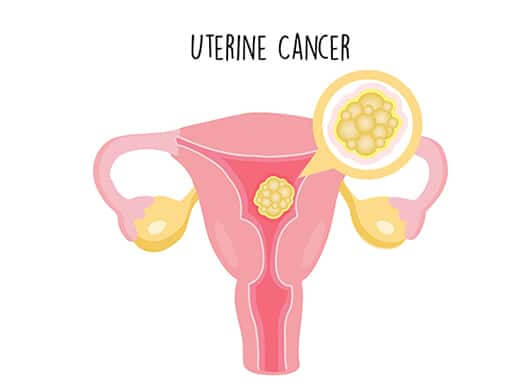- Imaging
- Laboratory
- Hysteroscopy - It is a procedure where the doctor inserts a thin, flexible, lighted tube (hysteroscope) through the vagina and cervix into the uterus. The lens on the hysteroscope allows the doctor to examine the inside of the uterus and endometrium and enables them to take a biopsy from the abnormal endometrium to check for anomalies.
- Ultrasound - Using sound waves to create a picture of the uterus. The doctor may recommend a transvaginal ultrasound to look at the thickness and texture of the endometrium. This test helps the doctor look for abnormalities in the uterine lining.
- Magnetic resonance imaging (MRI) - An MRI is the diagnostic tool of choice for endometrial cancers. It uses the interaction of radio waves and magnetic field, which is processed in a high-speed computer system to produce detailed scan pictures of the tissue, organs, bones, ligament and cartilage. It may be useful in detecting tumours and their metastases. This diagnostic technique offers greater soft tissue contrast than a CT scan. A contrast may be injected into a vein before the scan for better imaging. MRI scans do not subject the patient to radiation and are very useful to determine the extent of spread into the wall of the uterus, the extent of spread to the nodes and the status of the liver.
- PET CT - It is considered to assess spread to regional nodes or distant metastases to other parts of the body. It provides functional and morphological details by using a radioactive isotope to identify the sites to which cancer has spread.
- Procedures
- Pipelle Biopsy - This is an outpatient procedure. In this procedure, a small sample of tissue is taken from the endometrium (uterine lining). This sample is then sent for further evaluation.
- Dilation and Curettage (D & C) - It is a procedure done under general anaesthesia/spinal anaesthesia to remove a tissue sample from inside the uterus to diagnose certain uterine conditions. This sample is then sent for further evaluation.
- Blood Test- Routine blood investigations and tests for elevated levels of (CA) 125 may help in the diagnosis of uterine cancer.
- Pathology- The tissue sample collected is further evaluated to determine the type of cancer and grading.



.png)
